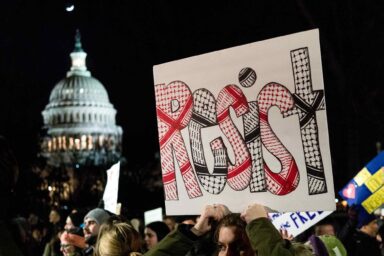On his way out of the door, Joe Biden issued preemptive pardons to Anthony Fauci, Gen. Mark Milley, and those involved in the January 6 committee. It is a move that could backfire in four years.
|
Listen To This Story
|
On his last day in office, President Joe Biden on Monday issued preemptive pardons for Anthony Fauci, Gen. Mark Milley, members and staff of the congressional committee that investigated the January 6 insurrection, and the Capitol police officers who testified before the panel.
On a superficial level, these pardons may make sense.
In a statement justifying his decision, Biden noted that Donald Trump and his allies have threatened Fauci, the former director of the National Institute of Allergy and Infectious Diseases; Milley, the former chairman of the joint chiefs of staff; and the members of the January 6 panel with criminal prosecution.
“These public servants have served our nation with honor and distinction and do not deserve to be the targets of unjustified and politically motivated prosecutions,” Biden declared.
The outgoing president added that, while he believes in the rule of law and that all of the above would be exonerated if they were to be charged, he could not idly stand by.
“Baseless and politically motivated investigations wreak havoc on the lives, safety, and financial security of targeted individuals and their families,” Biden said. “Even when individuals have done nothing wrong — and in fact have done the right thing — and will ultimately be exonerated, the mere fact of being investigated or prosecuted can irreparably damage reputations and finances.”
That part is understandable.
However, on another level, the pardons set a dangerous precedent.
Most importantly, they can now serve as a justification for Trump pardoning any number of individuals in his administration for actual wrongdoing that they may commit in the coming four years.
It’s simply not good for the rule of law if preemptive pardons are issued for government officials… especially those serving under someone like Trump.
In addition, just like the blanket get-out-of-jail card that the president issued for his son Hunter last year, after repeatedly saying he would not do so, they hint at impropriety.
Biden tried to preempt that by saying that “the issuance of these pardons should not be mistaken as an acknowledgment that any individual engaged in any wrongdoing, nor should acceptance be misconstrued as an admission of guilt for any offense,” but that’s just not how things work in this media landscape.
It remains to be seen whether all of the individuals the president named will accept the pardons.
Both Milley and Fauci indicated that they would.
“After forty-three years of faithful service in uniform to our Nation, protecting and defending the Constitution, I do not wish to spend whatever remaining time the Lord grants me fighting those who unjustly might seek retribution for perceived slights,” Milley stated. “I do not want to put my family, my friends, and those with whom I served through the resulting distraction, expense, and anxiety.”
Fauci, who is 84 years old, will also accept the pardon.
“Let me be perfectly clear: I have committed no crime and there are no possible grounds for any allegation or threat of criminal investigation or prosecution of me,” he said in a statement. “The fact is, however, that the mere articulation of these baseless threats, and the potential that they will be acted upon, create immeasurable and intolerable distress for me and my family.”
Perhaps the most interesting cases will be those of former Reps. Liz Cheney (R-WY) and Adam Kinzinger (R-IL), who served on the January 6 panel.
The two former GOP lawmakers are among the most fervent critics of Trump in his own party, and they may just view a potential prosecution as a badge of honor and another opportunity to show the incoming president’s true colors, even if that happens at their own expense.
Adam Schiff (D-CA), who also served on the committee but is now a senator, said last year that he would not need a pardon and would not accept it, and he urged Biden not to issue one.




